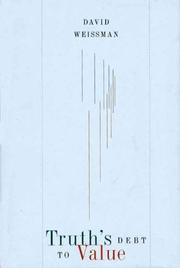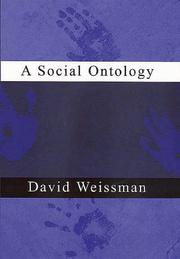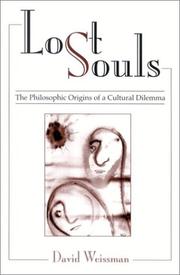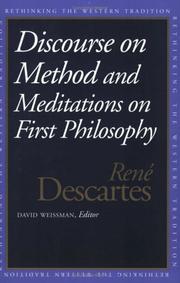| Listing 1 - 7 of 7 |
Sort by
|

ISBN: 0300054254 Year: 1993 Publisher: New Haven ; London Yale University Press
Abstract | Keywords | Export | Availability | Bookmark
 Loading...
Loading...Choose an application
- Reference Manager
- EndNote
- RefWorks (Direct export to RefWorks)
Truth --- Valeurs (Philosophie) --- Values --- Vérité --- Waarden (Filosofie) --- Waarheid --- Axiology --- Worth --- Aesthetics --- Knowledge, Theory of --- Metaphysics --- Psychology --- Ethics --- Conviction --- Belief and doubt --- Philosophy --- Skepticism --- Certainty --- Necessity (Philosophy) --- Pragmatism --- Truth. --- Values.

ISBN: 0300079036 9780300079036 Year: 2000 Publisher: New Haven (Conn.): Yale university
Abstract | Keywords | Export | Availability | Bookmark
 Loading...
Loading...Choose an application
- Reference Manager
- EndNote
- RefWorks (Direct export to RefWorks)
Being --- Etre (Philosophie) --- Ontologie --- Ontology --- Social systems --- Sociale systemen --- Systèmes sociaux --- Zijn (Filosofie) --- Zijnsleer --- Sociology --- System theory --- Philosophy --- Metaphysics --- Necessity (Philosophy) --- Substance (Philosophy) --- Ontology. --- Social systems.

ISBN: 0791457567 0791457559 Year: 2003 Publisher: Albany State University of New York Press
Abstract | Keywords | Export | Availability | Bookmark
 Loading...
Loading...Choose an application
- Reference Manager
- EndNote
- RefWorks (Direct export to RefWorks)
Mind and body. --- Body [Human ]--Psychological aspects --- Body and mind --- Esprit et corps --- Geest en lichaam --- Mind --- Mind and body --- Mind-cure --- Somatopsychics --- Body and soul (Philosophy) --- Human body --- Mind-body connection --- Mind-body relations --- Brain --- Dualism --- Philosophical anthropology --- Holistic medicine --- Mental healing --- Parousia (Philosophy) --- Phrenology --- Psychophysiology --- Self --- Psychological aspects
Book
ISBN: 178374877X 1783748761 1783748753 9781783748778 9781783748785 1783748788 9781783748792 1783748796 9781783748808 178374880X Year: 2020 Publisher: Cambridge, England : Open Book Publishers,
Abstract | Keywords | Export | Availability | Bookmark
 Loading...
Loading...Choose an application
- Reference Manager
- EndNote
- RefWorks (Direct export to RefWorks)
"There is agency in all we do: thinking, doing, or making. We invent a tune, play, or use it to celebrate an occasion. Or we make a conceptual leap and ask more abstract questions about the conditions for agency. They include autonomy and self-appraisal, each contested by arguments immersing us in circumstances we don't control. But can it be true we that have no personal responsibility for all we think and do? Agency: Moral Identity and Free Will proposes that deliberation, choice, and free will emerged within the evolutionary history of animals with a physical advantage: organisms having cell walls or exoskeletons had an internal space within which to protect themselves from external threats or encounters. This defense was both structural and active: such organisms could ignore intrusions or inhibit risky behavior. Their capacities evolved with time: inhibition became the power to deliberate and choose the manner of one's responses. Hence the ability of humans and some other animals to determine their reactions to problematic situations or to information that alters values and choices. This is free will as a material power, not as the conclusion to a conceptual argument. Having it makes us morally responsible for much we do. It prefigures moral identity. Closely argued but plainly written, Agency: Moral Identity and Free Will speaks for autonomy and responsibility when both are eclipsed by ideas that embed us in history or tradition. Our sense of moral choice and freedom is accurate. We are not altogether the creatures of our circumstances."--Publisher's website.
Free will and determinism. --- Compatibilism --- Determinism and free will --- Determinism and indeterminism --- Free agency --- Freedom and determinism --- Freedom of the will --- Indeterminism --- Liberty of the will --- Determinism (Philosophy)
Book
ISBN: 3110479257 3110479818 9783110479812 9783110479829 3110479826 9783110477924 3110477920 9783110479256 Year: 2016 Publisher: Berlin Boston
Abstract | Keywords | Export | Availability | Bookmark
 Loading...
Loading...Choose an application
- Reference Manager
- EndNote
- RefWorks (Direct export to RefWorks)
Meaning (significance) and nature are this book’s principal topics. They seem an odd couple, like raisins and numbers, though they elide when meanings of a global sort—ideologies and religions, for example—promote ontologies that subordinate nature. Setting one against the other makes reality contentious. It signifies workmates and a coal face to miners, gluons to physicists, prayer and redemption to priests. Are there many realities, or many perspectives on one? The answer I prefer is the comprehensive naturalism anticipated by Aristotle and Spinoza: "natura naturans, natura naturata." Nature naturing is an array of mutually conditioning material processes in spacetime. Each structure or event—storm clouds forming, nature natured—is self-differentiating, self-stabilizing, and sometimes self-disassembling; each alters or transforms a pre-existing state of affairs. This surmise anticipated discoveries and analyses to which neither thinker had access, though physics and biology confirm their hypothesis beyond reasonable doubt. Hence the question this book considers: Is reality divided:nature vrs. lived experience? Or is experience, with all its meanings and values, the complex expression of natural processes?
Philosophy of nature. --- Meaning (Philosophy) --- Philosophy --- Semantics (Philosophy) --- Nature --- Nature, Philosophy of --- Natural theology --- Spinoza, Benedictus de, --- Ispīnūzā, --- Spinoza, Baruch, --- Espinoza, Baruch d', --- Sbīnūzā, --- Espinosa, Baruch de, --- De Spinoza, Benedictus, --- Shpinozah, --- Shpinozah, Barukh, --- Spinoza, Benedict de, --- Spinoza, Barukh, --- Spinoza, Baruch de, --- Spinoza, Benoît de, --- ספינאזא, ברוך דע --- ספינאזא, ברוך, --- שפימוזה, ברוך --- שפינאזא, בענעדיקט --- שפינאזא, ברוך --- שפינאזע, ברוך --- שפינוזא, בנדיקטוס --- שפינוזהת ברוך, --- שפינוזה, ברוך --- שפינוזה, ברוך די, --- שפינוזה, ברוך, --- שפינוזה, ב. --- سبينوزا، بندكتس --- de Spinoza, Benedictus --- Spinoza, Benedictus de --- Spinoza, Baruch --- Spinoza, Benedict de --- Aristotle. --- Natura Naturans. --- reality. --- significance.
Book
Year: 2020 Publisher: Cambridge, England : Open Book Publishers,
Abstract | Keywords | Export | Availability | Bookmark
 Loading...
Loading...Choose an application
- Reference Manager
- EndNote
- RefWorks (Direct export to RefWorks)
"There is agency in all we do: thinking, doing, or making. We invent a tune, play, or use it to celebrate an occasion. Or we make a conceptual leap and ask more abstract questions about the conditions for agency. They include autonomy and self-appraisal, each contested by arguments immersing us in circumstances we don't control. But can it be true we that have no personal responsibility for all we think and do? Agency: Moral Identity and Free Will proposes that deliberation, choice, and free will emerged within the evolutionary history of animals with a physical advantage: organisms having cell walls or exoskeletons had an internal space within which to protect themselves from external threats or encounters. This defense was both structural and active: such organisms could ignore intrusions or inhibit risky behavior. Their capacities evolved with time: inhibition became the power to deliberate and choose the manner of one's responses. Hence the ability of humans and some other animals to determine their reactions to problematic situations or to information that alters values and choices. This is free will as a material power, not as the conclusion to a conceptual argument. Having it makes us morally responsible for much we do. It prefigures moral identity. Closely argued but plainly written, Agency: Moral Identity and Free Will speaks for autonomy and responsibility when both are eclipsed by ideas that embed us in history or tradition. Our sense of moral choice and freedom is accurate. We are not altogether the creatures of our circumstances."--Publisher's website.

ISBN: 0300067739 0300067720 Year: 1996 Publisher: New Haven (Conn.): Yale university
Abstract | Keywords | Export | Availability | Bookmark
 Loading...
Loading...Choose an application
- Reference Manager
- EndNote
- RefWorks (Direct export to RefWorks)
First philosophy. --- Knowledge, Theory of. --- Methodology. --- Science --- Hulpwetenschappen --- Filosofie. --- First philosophy --- Knowledge, Theory of --- Methodology --- Epistemology --- Theory of knowledge --- Philosophy --- Psychology --- Metaphysics --- Scientific method --- Logic, Symbolic and mathematical --- Research --- Humanities Methodology
| Listing 1 - 7 of 7 |
Sort by
|

 Search
Search Feedback
Feedback About UniCat
About UniCat  Help
Help News
News